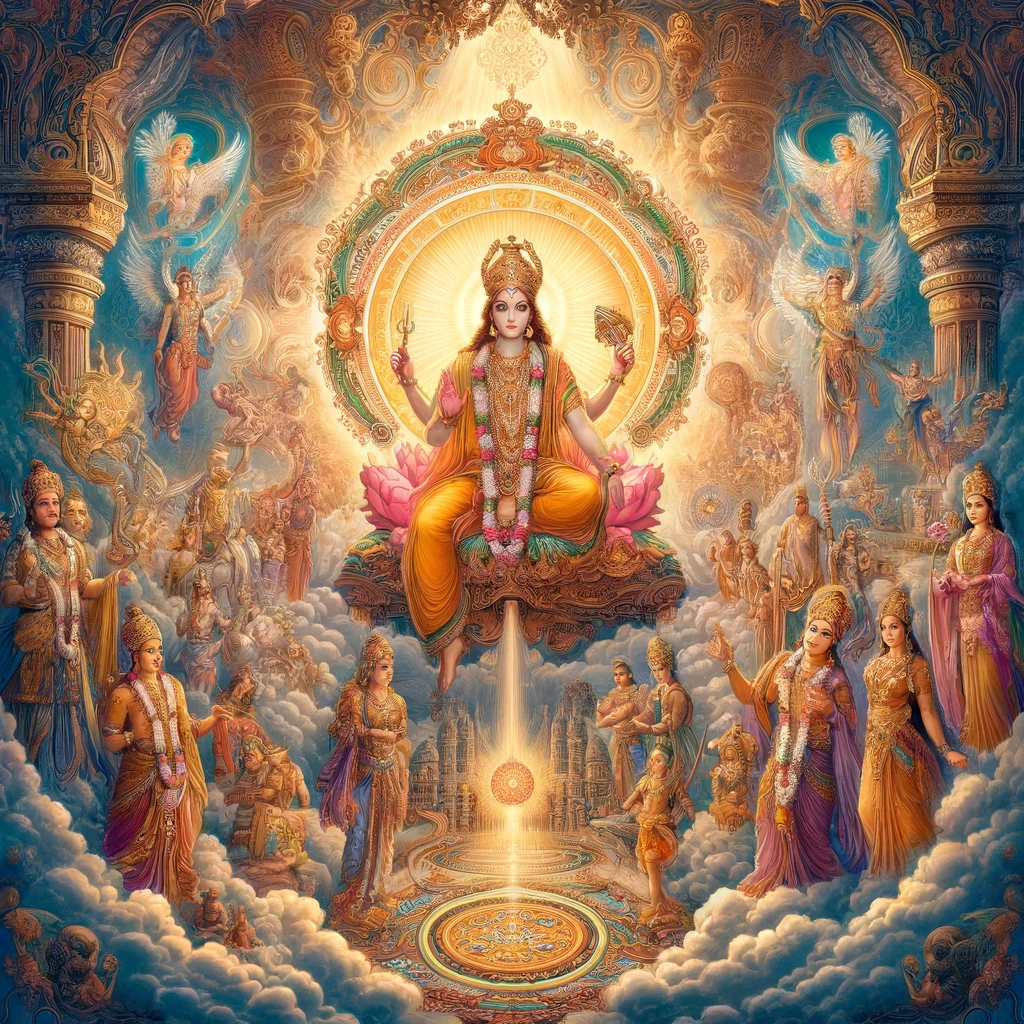ಅಜಃ ಸರ್ವೇಶ್ವರಃ ಸಿದ್ಧಃ ಸಿದ್ಧಿಃ ಸರ್ವಾದಿರಚ್ಯುತಃ |
ವೃಷಾಕಪಿರಮೇಯಾತ್ಮಾ ಸರ್ವಯೋಗವಿನಿಸ್ಸೃತಃ || ೧೧ ||
ajaḥ sarveśvaraḥ siddhaḥ siddhiḥ sarvādiracyutaḥ |
vṛṣākapirameyātmā sarvayogavinissṛtaḥ || 11 ||
ajaḥ (ಅಜಃ)
ajaḥ (ಅಜಃ) means one who is not born from anyone; however, he is born in everyone. Looks like opposite meanings, correct? Correct, God is not born from anyone. However, he is present as light in every womb and simultaneously is born in various forms. The womb and the sanctum sanctorum are called Garbha (ಗರ್ಭ). In the temple, when one invokes the omnipresent God in the idol, the God being invites will come. Similarly, God who is omnipresent will be present as energy/ light in the womb and will be simultaneously is born in various forms from numerous wombs. Hence, he is known as ajaḥ (ಅಜಃ).
sarveśvaraḥ (ಸರ್ವೇಶ್ವರಃ)
One who comes when called with devotion, and the one who is the controller/ruler of all forces (Īśa, ಈಶ) is known as sarveśvaraḥ (ಸರ್ವೇಶ್ವರಃ).
siddhaḥ (ಸಿದ್ಧಃ)
All the Scriptures and knowledge (Sashtra and Veda) written or spoken in the entire universe explain the tenet of the one and only accomplished God. The one who is present in all Shastras and Vedas, the one who is present in all devotees, independent reality (Paramapurusha), and one who is present in one form (Roopa) is Siddha.
siddhiḥ (ಸಿದ್ಧಿಃ)
The one who bestows us with the four Purushartha (i.e., object of pursuit for living beings) - artha (prosperity and economic values), kama (sensual pleasures), dharma (righteousness and morality), and moksha (liberation from the cycle of reincarnation) is known as siddhiḥ (ಸಿದ್ಧಿಃ). The one who bestows success for our good action (satkarma) is siddhiḥ (ಸಿದ್ಧಿಃ).
Sarvādi (ಸರ್ವಾದಿ)
He was present before existence and accepts everything, and he is responsible for everything and hence he is known as Sarvādi (ಸರ್ವಾದಿ) - The universe began as just a single point, then expanded and stretched to grow as large as it is right now—and it is still stretching! And finally will collapse into a single point and that single point is known as Sarvādi (ಸರ್ವಾದಿ) and he is God.
acyutaḥ (ಅಚ್ಯುತಃ)
He who accepts everything and is untouched by dereliction (ಚ್ಯುತಿ) and the one who is complete in his action and characteristics is acyutaḥ (ಅಚ್ಯುತಃ) – he creates, sustains, and destroys the multiverse, but is always complete in his duties and characteristics and is untouched by his action.
vṛṣākapi (ವೃಷಾಕಪಿ)
From a surface It looks like vṛṣākapi (ವೃಷಾಕಪಿ) = vṛṣā (ವೃಷ) + kapi (ಕಪಿ). vṛṣā (ವೃಷ) means one is responsible for rains (ಮಳೆ ಸೂರಿಸುವವನು) and kapi (ಕಪಿ), Kam + Payate, means one who makes us drink water. However, vṛṣā (ವೃಷಾ) means the essence of Dharma; one can also interpret this as the one who pours what we desire. Akapi (ಅಕಪಿ) means one who destroys sorrows. Hence, vṛṣākapi (ವೃಷಾಕಪಿ) means one who pours rain through Dharma (faith) what we desire, one who destroys sorrows, one who grants us perfect happiness, and he himself is in the state of complete bliss.
Ameyātmā (ಅಮೇಯಾತ್ಮಾ)
Our heart and mind have limitations and we cannot comprehend beyond this. It is impossible to comprehend God by our mind. Hence God is known as Ameyātmā (ಅಮೇಯಾತ್ಮಾ). Although it is impossible to fully comprehend God, he is subatomic and pervades in us. We can comprehend five elements earth, water, fire, air, sky, and the materials made of these five elements. However, God is different from these. We cannot comprehend the energy i.e., God that we are made of. We should try to comprehend God through our inner self (eyes), and not looking outside into the materialistic world.
sarvayogavinissṛtaḥ (ಸರ್ವಯೋಗವಿನಿಸ್ಸೃತಃ)
Here the word yoga means relation or means or idea. We are in relation to the object surrounding us. God is present everywhere (he is omnipresent), however, he is not related to attached to anything. Good example of this is space, it is present everywhere, but is not related to or attached to anything. We can feel and sense earth/soil, water, fire, or air. However even though space is present everywhere, it is not attached to anything. God is also like space. Although he is present everywhere, he is not attached to anything. Hence the God is known as sarvayogavinissṛtaḥ (ಸರ್ವಯೋಗವಿನಿಸ್ಸೃತಃ).


